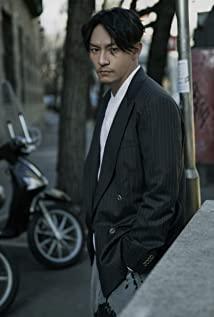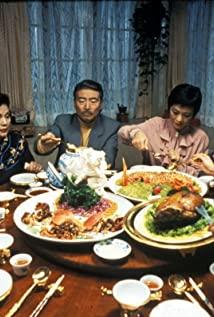There are many expressions of desire in the movie, Li Mubai's attachment to Yu Xiulian, Yu Xiulian's deep love for Li Mubai, Yu Jiaolong and Li Mubai's ambiguity, Yu Jiaolong and Xiaohu The strong friendship, and even the blue-eyed fox's master-disciple relationship with Yu Jiaolong, these desires are intertwined, and those who are in the web of desire are unconsciously swept away by the turbulent undercurrent.
At the beginning of the film, the theme is clearly named. After Li Mubai returned from retreat and practice, Yu Xiulian asked about all kinds of retreats. Li Mubai said that there is light in the experience, and there is a profound state of Taoist practice. Yu Xiulian couldn't help but admire. At this time, Li Mubai said something inexplicable, " I do not have the joy of attaining the Dao, on the contrary, I am surrounded by a sense of loneliness and sorrow." This sentence will feel like a kind of loneliness that is beyond the cold of high places, but it can be explained in later stories. He found that Li Mubai did not restrain his own desires as he expected. On the contrary, he took the initiative to violate the Taoist tenets he believed in to some extent, and began to face his own desires and hoped to make a difference. He wanted to take Yu Jiaolong as his apprentice, and his confession to Yu Xiulian was proof.
Briefly analyze the major desires in Li Mubai's heart:
1. A sense of security. Maintain the status of a hero who is admired by everyone in the arena. This was also an identity he valued the most before, and it was related to his insistence on the Taoist idea of promoting pure heart and few desires. This identity gave him a sense of security, but because of this identity, he couldn't be with Yu Xiulian, who was once betrothed to his friend, and suppressed his lust. In addition, he is not without personal preferences and even prejudices. However, he has to bear the golden signboard of a warrior of the Wudang School. He is unsmiling and impartial. He doesn't want to do whatever he wants like ordinary people. The sadness of his death after entering the Tao , I think it is his nostalgia for the world. Yu Xiulian didn't understand this. On the contrary, what she valued more was the status he had to maintain. In her mind, Li Mubai was not only a man she admired, but also a symbol. Some heroic infatuation.
When dealing with this identity, Li Mubai was persistent at first, then gave up, and finally returned to being persistent. His status symbol in the rivers and lakes is the Qingming sword. He gave away the sword, lost it, and then found it again. He said a very interesting thing, and it was only when he lost it that he knew how reluctant he was. After a long conversation with Yu Xiulian in the bamboo forest, he took the opportunity to express the so-called helplessness of people living in the rivers and lakes, which is in contrast to the previous retirement.
2 Resistance, the venting of one's own repression. This outlet is one of her feelings for Yu Xiulian, and the other is the strange behavior of forcing Yu Jiaolong to be her apprentice. The feelings for Yu Xiulian are obvious. For example, Li Mubai said to Yu Xiulian in the bamboo forest, "I can't stop my desire, I want to be with you--sitting like this, I can feel a kind of peace instead." Li Mubai's feelings for Yu Jiaolong are worth talking about. Some people think that Li Mubai has lust for Yu Jiaolong, I think it's more throbbing than lust.
Yu Jiaolong was a flashpoint in Li Mubai's self-desire struggle, which Li Mubai didn't realize at first. Yu Jiaolong's arrogant character was criticized by Li Mubai at first. In a scene of robbing a sword on the roof, Li Mubai tried to educate Yu Jiaolong with the Taoism he believed in, telling her that she would not last long if she was brave enough to endure calm. win. This rhetoric should come from the ninth chapter of the Tao Te Ching, "It's not as good as it is if you hold on to it and gain it. It's not as good as it is. It's hard to keep it up. It's full of gold and jade, but no one can keep it. It's arrogant and rich, and it's your fault." Yu Jiao The dragon's response was to sneer and ignore it. At this time, Li Mubai's reaction was very strange, he actually wanted to accept her as his apprentice. I think what Li Mubai is trying to persuade is actually his own desires. Yu Jiaolong's rebellious character disturbed Li Mubai's heart. Li Mubai vaguely saw in Yu Jiaolong that he once had something that he had never realized, but his reaction was to obey. He acquired his hero status, taught her how to behave in an attempt to accept her as a disciple. But Li Mubai made the opposite choice in his heart. The proof is that he did not forcefully grab his sword from Yu Jiaolong, but stood in place and let her escape.
The Qingming Sword is one of his desires - the sense of security brought by the identity of a hero, and it is also his greatest depression. He gave up the sword that symbolized his status to Yu Jiaolong. In my opinion, it was a catharsis of his own desires and a recognition of rebellion and resistance. This also explains why Yu Xiulian, who has always been gentle and elegant, would fight Yu Jiaolong at the security guard. How could Yu Xiulian not be angry when she saw the sword in Yu Jiaolong's hands? This sword is a symbol in Yu Xiulian's heart, symbolizing her yearning for a hero and her dedication to her lover.
3 return. The scene of Li Mubai and Yu Jiaolong fighting in the bamboo forest is the climax of the overall situation. If Li Mubai repressed his own desires at first, and felt sad and lonely after retreating, and even met Yu Jiaolong, which caused his subconscious desire to fight violently, a scene in Zhulin was his return to his identity and his desire to repressed. In the scene of the fight in the bamboo forest, there is a very representative scene. Li Mubai and Yu Jiaolong are standing on the two ends of a bent bamboo. Li Mubai flutters and Yu Jiaolong is on the other end. The dragon swung hard and Li Mubai sat firmly on Mount Tai on the other side. I think this scene shows that Li Mubai is confident that he has tamed his desires and is determined to accept Yu Jiaolong as his disciple - to guide his inner rebellious emotions - to maintain his hero status, after Yu Jiaolong expresses that he cannot surrender, In a rage, Li Mubai plunged his identity symbol sword into the bottomless lake. This is despair and anger at his inability to control his own desires.
4 It's better to go back. Li Mubai said to Yu Xiulian when he was dying, "I will tell you with my last breath, I have always loved you deeply." At the last moment, he let go of everything and expressed his truest desire in his heart. , and completely gave up and was unable to suppress desire.
It is also worth mentioning that the "Xuan Fei Sword Art" that Li Mubai wanted to teach Yu Jiaolong also came from the sixth chapter of the Taoist classic "Tao Te Ching" ""The God of the Valley does not die, it is called Xuan Fei. The gate of Xuanhen is called the root of heaven and earth. The mysterious female here has the meaning of subtle metaplasia and reproduction. The female is interpreted as a synonym for motherhood and female reproductive function, referring to the female genitalia. The image of the sword in Freud's psychoanalysis alludes to the male genitalia, so I don't know if the director did it intentionally or unintentionally.
Throughout the whole film, Director Ang Lee's personal attitude towards the theme of desire is not very clear, or even a little vague, but this is also in line with his understanding of desire. Continually, the rationale is still chaotic. Finally, there is quite a bit of the meaning of Buddhism "all things are impermanent, everything is suffering".
View more about Crouching Tiger, Hidden Dragon reviews









